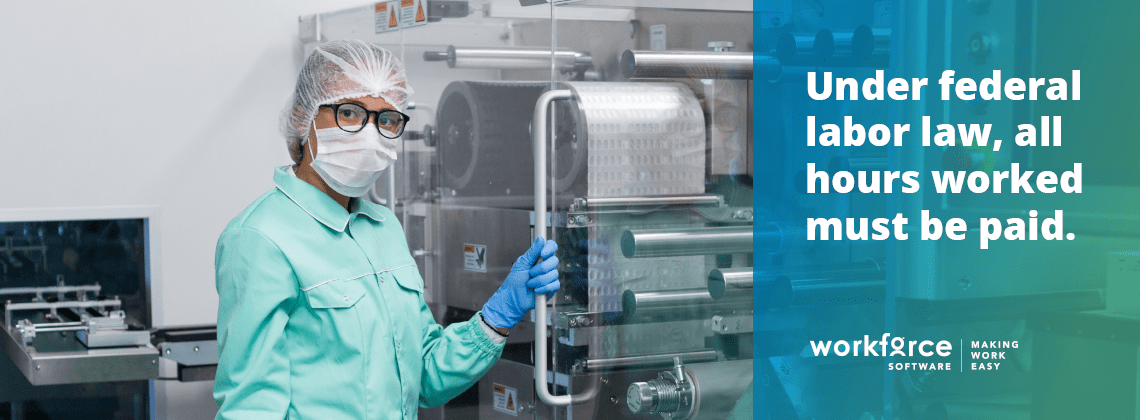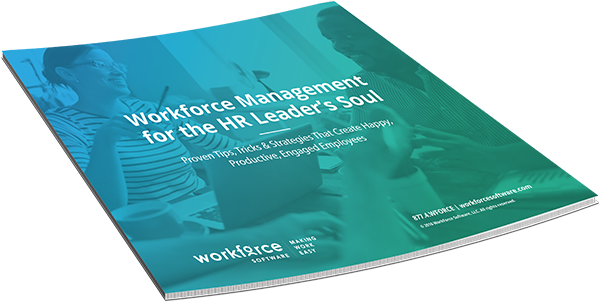Don’t Get Sued for Unpaid Work

Will sat down next to his friend, Aaron, at the bar.
“You’re late,” said Aaron, sliding over a warm beer. “I’ve been here almost an hour.”
“Sorry,” said Will. “I’m straight from work. The equipment line took forever.”
“The equipment line?”
“Yeah,” said Will, an assembly worker at a manufacturing plant. “Everyone on the production line has to wear a smock, safety glasses, ear plugs, heat-resistant gloves, yada yada yada.” He swigged his flat Miller Lite. “But we can’t take the gear home. We have to pick it up and drop it off each day.”
“Why?”
“They clean it for us,” said Will. He took another swig. “Anyway, today was brutal.”
“Well how long does this donning and doffing usually take?” asked Aaron, a lawyer.
“About 15 minutes before the shift,” said Will. “About the same after.”
“Half an hour a day?” said Aaron, surprised. “That’s two and a half hours a week.” He opened the calculator app on his phone. “That’s 125 extra hours of work a year, man!”
“I guess it is,” said Will. “Shit.”
“As long as you’re getting paid for it …”
“I’m not.”
Subscribe to The WorkForce Blog
Learn the art and science of maintaining productive, happy, engaged employees.
“Should I be?”
That’s a good question.
So good, in fact, that the United States Supreme Court addressed it for the first time in 1956 (Steiner v. Mitchell), deciding that donning and doffing was “an integral and indispensable part of the principal activities” and, therefore, compensable time.
Since the Steiner decision, however, courts have been split. Generally, judges rule that the time it takes employees to put on (don) and take off (doff) essential, non-unique gear did not have to be paid because:
- It’s not work (i.e., not in line with traditional job duties)
- It’s de minimis (i.e., not enough time is spent to merit consideration)
Conversely, the donning and doffing time required for more unique, more cumbersome gear (e.g., a butcher’s chain apron) has generally been ruled as compensable. In other words …
It depends.
It depends on the circumstances, which vary from one organization to the next.
And while donning and doffing can be a serious issue in its own right, it coaxes a larger, more general employment-law question to the surface:
Are your nonexempt employees working compensable hours off the clock?
Nonexempt employees are typically paid by the hour. Under the Fair Labor Standards Act, these workers are entitled to pay for every hour they work.
Donning and doffing, of course, is only one scenario that could create extra, off-the-clock work. Others exist as well. Some are fueled by technology, some by ignorance.
For instance, a FLSA violation could be triggered if a nonexempt worker constantly:
- Answers work-related phone calls …
- Replies to business emails at home …
- Stays several minutes past quitting time when asked to …
Even if the action only takes a handful of minutes, over a consistent basis, those minutes can add up to significant time gaps. Gaps that could be used against an employer.
 Workforce Management for the HR Leader’s Soul
Workforce Management for the HR Leader’s Soul
This book will help you create a healthy, rewarding environment for the people that keep your company moving forward.
Cut your losses.
Several ways* to do this as an organization:
1. Training:
Training sessions ensure employees are aware of FLSA regulations. Fundamentally:
- Exempt employees should know to refrain from emailing, texting, phoning, or otherwise contacting non-exempt employees about work-related matters once the work day is over.
- Non-exempt employees should know their rights as hourly workers, understanding that they’re not expected to work outside of their normal business hours.
2. Policy:
Policies ensure employees are held to appropriate standards. Smart policies prevent issues by establishing expectations about things like:
- Time. For example, nonexempt employee can’t work overtime without (written) permission. Get everything in writing.
- Equipment. For example, smartphones, tablets, and laptops should only be provided to nonexempt employees whose jobs truly warrant their after-hours use. (Because providing these devices to nonexempt employees makes it difficult to argue that those people weren’t permitted to work after hours.)
3. Technology:
Software makes data more accurate and processes more cost effective. This is the product of:
- Customization: Track hours—and other data—accurately, perfectly.
- Automation: Use accurate data to automate efficient, safe processes.
“What are you going to do, Will?” said Aaron
Cut. Your. Losses.
Modern workforce management software helps you work smarter.
*Always seek professional counsel before making legal decisions about your business.

 Workforce Management for the HR Leader’s Soul
Workforce Management for the HR Leader’s Soul